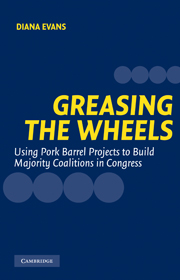Book contents
- Frontmatter
- Contents
- List of Tables and Figures
- Acknowledgments
- 1 Introduction
- 2 Pork Barrel Politics and General Interest Legislation
- 3 Who Calls the Shots? The Allocation of Pork Barrel Projects
- 4 Highway Demonstration Projects and Voting on the Federal Highway Program
- 5 Presidential Bargaining with Congress: The NAFTA Bazaar
- 6 Pork Barreling in the Senate: Do Both Parties Do It?
- 7 Conclusions
- References
- Index
5 - Presidential Bargaining with Congress: The NAFTA Bazaar
Published online by Cambridge University Press: 18 November 2009
- Frontmatter
- Contents
- List of Tables and Figures
- Acknowledgments
- 1 Introduction
- 2 Pork Barrel Politics and General Interest Legislation
- 3 Who Calls the Shots? The Allocation of Pork Barrel Projects
- 4 Highway Demonstration Projects and Voting on the Federal Highway Program
- 5 Presidential Bargaining with Congress: The NAFTA Bazaar
- 6 Pork Barreling in the Senate: Do Both Parties Do It?
- 7 Conclusions
- References
- Index
Summary
Anyone with adequate political resources can be a policy coalition leader, as Chapter 2 explains. Among those people are committee and party leaders in each house of Congress. Some of those leaders have access to distributive benefits to trade for votes on general interest legislation. So does the president, who can, for example, influence the allocation of some of the massive amounts of money distributed on a discretionary basis by the bureaucracy, as candidates who challenge his reelection often discover to their dismay. This chapter provides an account and systematic analysis of President Clinton's use of distributive benefits to persuade the House of Representatives to pass legislation to implement the North American Free Trade Agreement (NAFTA) in 1993. He did so in concert with the leadership of the House Republicans, not his own majority-party Democrats. Thus we move from a focus in Chapters 3 and 4 on the use of distributive benefits by committee leaders in the House to a focus on the president and minority party leaders in that same body.
On November 17, 1993, the House of Representatives approved NAFTA by passing H.R. 3450, a bill to provide for implementation of the terms of that agreement. The Clinton administration's victory on the 234-200 vote had been in doubt until only a week earlier. By all accounts, the administration prevailed in the end only with a series of concessions to members of Congress representing a long list of local interests that felt threatened by NAFTA's liberalization of trade with Mexico and Canada.
- Type
- Chapter
- Information
- Greasing the WheelsUsing Pork Barrel Projects to Build Majority Coalitions in Congress, pp. 131 - 161Publisher: Cambridge University PressPrint publication year: 2004

